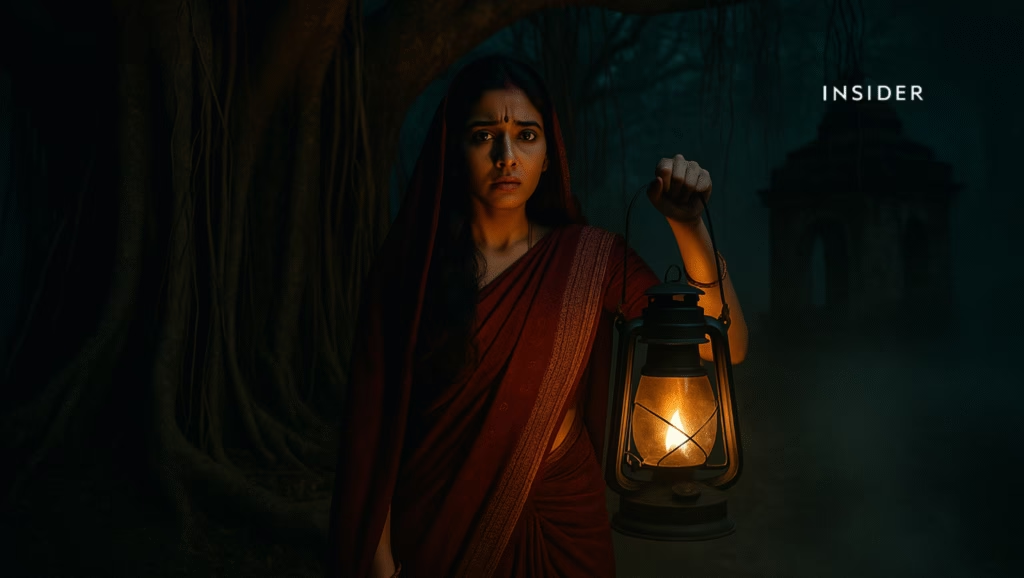
The night was deeper than ink when Meera stepped off the rickshaw onto the dusty road. Behind her, the driver shook his head and sped away, muttering prayers against the darkness. She pulled her shawl tighter around her shoulders and followed the flicker of a single lantern swinging on a wooden post: the entrance to Kaliyani Village.
No streetlights illuminated the path, only tall banyan trees whose aerial roots twined like skeletal fingers down toward the parched earth. Every breeze made the lantern quiver, casting the trees’ long shadows dancing across two narrow huts—and beyond them, the ruined shrine of Goddess Kali.
READ PREVIOUS UPDATE : Supernatural Story: Kali Haveli – The House of Shadows
Meera was a folklore writer, drawn to legends of spirits and curses. She’d come to Kaliyani on purpose. For generations, villagers spoke of the “Whispering Banyan”—a tree behind the shrine where a thousand voices murmured to trespassers at midnight. Anyone who heard the whispers was said to vanish without a trace.
She checked her watch. 11:45 PM. The moon peered through ragged clouds. Meera stepped past the first hut, its wooden door hanging open. Inside, she glimpsed a crushed brass lamp and a scattering of marigold petals. No sign of life. She swallowed and pressed on.
A narrow path led behind the shrine. She passed cracked stone steps, the goddess’s blackened idol staring down with hollow eyes. Animal skulls hung from the eaves like grim warnings. The air felt warmer here—stagnant and heavy.
At the path’s end stood the banyan tree: colossal, its trunk gnarled with age, roots trailing in every direction. Meera raised her flashlight and swept the beam across its bark. Faint carvings—names, dates, symbols of burning flames—were etched into the wood. Fresh scratches, too: as if something had tried to claw its way out.
Her heart beat faster. Meera lifted her recorder. “It’s almost midnight,” she whispered. “If the legend is true…” She trailed off, listening.
Seconds ticked by. The wind stirred. Then, as the clock in the distant temple tower struck twelve—DONG…—the banyan’s roots shivered, and a low breath of voices drifted on the wind.
They sounded like whispers layered one atop another: “Come… come… come…” A thousand soft calls weaving together in a single, mesmerizing hum.
Meera froze. Her pulse pounded in her ears. She held her breath to catch every syllable. The floor below her sandals vibrated—an almost heartbeat from the earth itself.
“Meera…” A whisper slid through the others, clear as a bell.
Her name.
She stumbled back. “Who—who’s there?” she whispered, voice cracking. But the voices only swelled, an ocean of sound consuming her thoughts.
Thermal sweat broke out on her forehead as the air tightened around her chest. She felt drawn forward, toward the trunk that now seemed to pulse with life.
A sudden gust extinguished her flashlight. She yanked it back on, but the beam danced wildly, revealing a pale figure stepping from the roots. A woman in a tattered white sari, her hair long and wet, eyes empty wells of black. Her feet hovered just above the ground—she made no sound as she moved.
Meera’s recorder flew from her hand. She spun away, tripping over a protruding root. She hit the earth hard, the breath knocked out of her. When she looked up, the ghost was holding the lantern—its light flickering.
The ghost tilted her head. “You heard us… now you belong to us.”
Meera scrambled backward, but thick roots snaked around her ankles, pinning her in place. She screamed, kicking, but the roots only tightened, biting into her skin.
The ghost knelt beside her, lantern casting a spectral glow on her face. Her lips peeled back: a smile too wide, too hungry. Meera felt a cold hand brush her cheek. Her skin prickled as if crawling with ants.
“Your heart… your blood… our passage home.” The whispering chorus rose again, flowing through the night. Meera’s chest heaved; panic threatened to swallow her.
She remembered the old tales: the banyan was a prison, trapping souls of villagers lost to famine and flood. At midnight, their spirits called out to the living, seeking release. But if a living soul heard their plea… they were doomed to replace one of the lost.
Meera fought for control. She closed her eyes and pressed her hands to her ears. The voices thundered inside her skull. “No! No! No!” she cried.
A sudden crack broke through the cacophony—the ghost’s lantern shattered against the trunk. Light splintered into a thousand shards on the dry leaves. The ghosts recoiled, hissing like wounded snakes.
The roots loosened. Meera scrambled free and darted to her feet. She ran—she didn’t look back. The whispers chased her, an unseen tide at her heels, drowning the world in sound.
Behind her, laughter: a cruel, hollow echo drifting through the hollows of the tree.
She burst through the shrine’s ruined archway and into the open courtyard. The wind had died. Only her ragged breaths and pounding heart filled the silence.
Meera tore off her shoes and dashed across the muddy compound toward the gate. The rickshaw driver’s lantern bobbed nearby. She reached him, voice trembling. “Drive! Now!”
He turned, face ashen. “Madam, the tree… it calls you.” His eyes flicked to the banyan, where one pale hand now emerged from a thick root, fingers curling around the bark. The ghost was reaching out, reaching for Meera.
She jumped into the rickshaw just as the gate slammed shut with a clap that shook the air. The driver gunned the engine, and the vehicle lurched forward, lights cutting through the mist.
She pressed against the wooden side, chest heaving. Rain began to fall, each droplet hissing as it met her overheated skin. The banyan tree receded in her mirror, silent once more—its whispers vanished, as if they’d never existed.
When they reached the main road, Meera forced herself to speak. “Did you see it?”
He nodded, voice barely audible. “The tree keeps its dead. It lost them once—now it collects the living.”
Meera shivered. On her recorder, the “REC” light was still blinking. She pressed play. For a moment, nothing but static. Then, faint at first, the thousand-voiced whisper:
“Meera… Meera… come…”
She dropped the recorder onto the seat. The device skittered under the rickshaw seat. She watched it disappear, unsure if she wanted the voices to follow her home.
The driver slowed to a crawl at the village outskirts. He stopped at the edge of a signpost reading “Next Town: 5 KM”.
He turned to her. “You won’t come back, will you?”
Meera wrapped her shawl tighter, gazing at the road ahead, already swallowed by night. “No,” she whispered. “Never again.”
But as the rickshaw pulled away, the wind rose once more. High above, in the branches of that ancient banyan, a single whisper rode the breeze—softer than a sigh, colder than the darkest hour:
“We will wait.”

